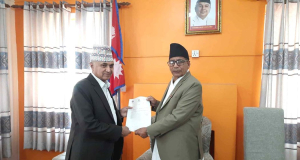The Supreme Court has ruled that the country’s legal provision for reservation should be based on people’s not instead of their caste or class.
The Supreme Court’s ruling came in response to the writ petition filed by Vinay Kumar Panjikar of Dhanusha demanding reservation in postgraduate level of medical education.
Panjikar had quoted Article 42 (Right to social justice) of the constitution to back his demand.
After the People’s Movement in 2006, Nepal’s constitution has provisioned reservation in various sectors for women, Janajatis, Madhesi, Dalits, the disabled, and people from least developed regions for civil servants working in security, education, public service and other sectors.
A joint bench of Deepak Kumar Karki and Dr Ananda Mohan Bhattarai have ruled that financially prosperous and those who have improved their condition by after getting reservation should not be allowed to avail reservation again in public service sectors.
Though the judges had made the ruling in December, 2020, the verdict’s full text was released only on Sunday.
Stating that the constitution has provisioned a goal with the reservation system, the ruling said that the system should be used properly in order to achieve that goal.
“The goal can only be achieved if the reservation system is focused on people’s needs rather than on their class or caste,” the ruling said.
The Supreme Court has ruled that reservation system should not be based on class or caste in a country inhabited by 126 castes with 123 languages.
“For example, the children of ministers, parliamentarians, professors, and industrialists among others, who have reached the upper class politically, economically or socially, can be placed in the non-reservation category,” the ruling said.
Similarly, the apex court’s ruling stated that the principle of reservation should be based on affirmative action and the existing provisions should also be amended accordingly.
The decision also stated that an individual should not be allowed to benefit from more than one reservation facility.
Nepal’s constitution provides reserved seats in the government for women, and certain caste and ethnic groups at all levels. Article 18(3) provisions that the state shall not discriminate citizens on grounds of origin, religion, race, caste, tribe, sex, economic condition, language, region, ideology or on similar other grounds.
“Provided that nothing shall be deemed to prevent the making of special provisions by law for the protection, empowerment or development of the citizens including the socially or culturally backward women, Dalit, indigenous people, indigenous nationalities, Madhesi, Tharu, Muslim, oppressed class, backward class, minorities, the marginalized, farmers, labours, youths, children, senior citizens, gender and sexual minorities, persons with disabilities, persons in pregnancy, incapacitated or helpless, backward region and indigent Khas Arya.”
However, despite these provisions, many marginalized groups – most significantly, women, Madhesis, Adibasi-janajatis and Dalits – remain severely under-represented.
Most sectors remain dominated by the higher-caste Khas Arya group, relegating other groups to less powerful positions.



